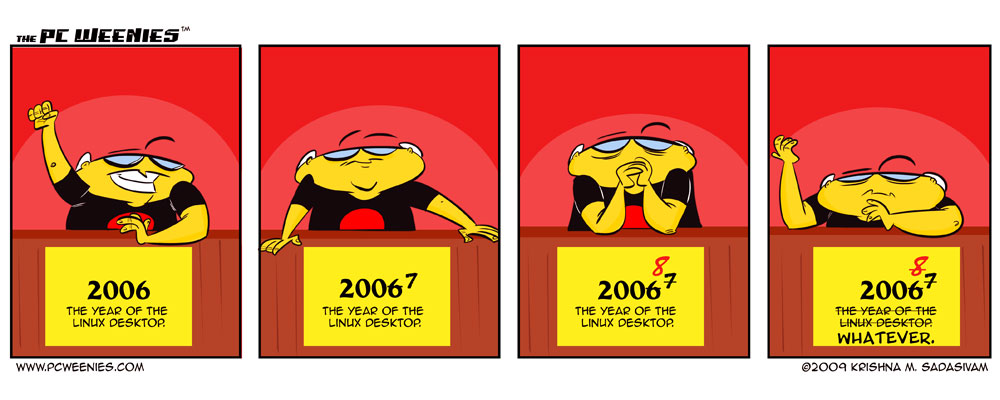The Truth About Linux
Chapter: The Comic
Is this year the year that Linux achieves mainstream acceptance on the desktop? Time will tell…
While it’s true that installing Linux has gotten much easier to do for the average user, many tech folks in the know still say it has a ways to go before widespread adoption. I’m excited to see what develops…
I’d love to see a company like Adobe embrace Linux more and make Linux flavored versions of the CS Suite available. But I’m not holding my breath for that to happen anytime soon.
Have you used Linux? Is it ready for the desktop? Let’s hear your take on the OS debate.
-Krishna





tpiro
January 2, 2009 at 3:23 amI was a big fan of linux until Apple released it’s unix-based operating system. Now I have all the stability and control of linux, plus my sound and graphic cards work without spending 12 hours tinkering. I hope I never have to go back.
sidusnare
January 2, 2009 at 4:00 amLinux has been a viable desktop for typical users for a long time. If all you want is a word processor and internet browsing, then linux has been a functional solution since abiword and Netscape navigator, and a mainstream-able solution since openoffice and firefox + flash.
The problem has always been installation. When you really think about, vanilla windows isn’t even there. MacOS is because they have the hardware platform locked down. People can reinstall windows because they have custom discs from the OEM that are either drive images or the OEMs drives rolled into the windows installer.
Many people talk about the mom test, and I have a typical mom. She uses Gentoo Linux. She cant maintain it,or install it, but she couldn’t do that for windows either.
Really what we are talking about is the tipping scale of barrier to entry and Microsoft dissatisfaction. Mac has a higher barrier to entry because its a learning curve plus an expensive cost. As Linux installers get more slick and easier to use, like Ubuntu, more people will give it a try.
Fisticupps
January 2, 2009 at 5:44 amLong-time Slackware user here. Started with Mandrake, migrated to Ubuntu, and then found myself in love with Slack. I’m not sure it’ll ever fully make it with most users… but I know several of my friends who at least use Ubuntu now (dual-booting or otherwise) who wouldn’t have touched the stuff a few years ago.
Jarmo
January 2, 2009 at 5:56 amI just installed Ubuntu 8.10 (linux) on x-mas week and it’s been working pretty damn good – better than Vista anyways – I only have had (still persists) one problem with Ubuntu which is that I can’t get sound directly from my headphones/speakers – laptop speakers are on simultaneously… etc
and I am using GIMP with Ubuntu and it runs more smoothly on my Ubuntu than windows version on Vista or XP… so, I’m pretty happy with the Ubuntu – WIFI, graphics everything (but sound) works fine.
I’m writing this from Ubuntu, too – it’s all good!!!
btw, good strip dude!
ezard
January 2, 2009 at 6:31 amwell,i have tried ubuntu 8.10 desktop 64bits for 9 days,and even the work for making the webcam,the printer..(the ati card driver is the easy stuff),the firefox in ubuntu didnt displayed flash as good as my firefox in windows xp..,and the codecs problems..even with the help of the big ubuntu forums..it is still better image,better play in windows xp..and i must addmit,ubuntu freezed with me 4 times in 9 days..i just coundt get it up more than 23hs..and my xp is up for 2 days now…
cyberwasteland
January 2, 2009 at 7:37 amIt’ll probably be while before linux is a mainstream desktop, but that edoesn’t mean it isn’t desktop ready.
I started using my curents OS, Mandriva Linux, about 3 months ago and installing it was a breeze, I just had to run the installer, choice it to make a new partition and install it there and it was done. It was probably easier then installing windows and while it was installing I could just continue using the live CD to browse the internet, etc.
So saying that instalation is the big problem with linux is completly wrong from my experience.
I’ve been using Mandriva for three months and it’s probably 2 months ago I have actualy used the windows dualboot for real. S
tayker
January 2, 2009 at 7:42 amNo it isn’t.
Someone mentioned the “mom test.” My mother can’t install or admin, but she knows how to update, install, and uninstall software.
With linux, it’s like having a glut of various distros of Windows or Mac OS X. What I mean by this is I know I can install a program on any Windows computer. On Linux, it depends on various factors, from the distro to package management – rpm vs make/config. I hate to bust the dreams of Linux fans, but most users don’t want to get that involved in with computer, and Windows and Macs have a software infrastructure that’s easy to manage. I know I would rather install or drag an app into the Applications folder instead of wrestling with make/config and dealing with missing lib errors.
Ubuntu is the closest Linux has come, but everyone still has there preference – i.e. Slackware, Mandriva (mine), Ubuntu, etc. When the Linux community starts focusing resources on 1 distro or a software infrastructure that’s in every distro, as well as an easy install system, then I think Linux will be in a prime position to really put a crimp into Windows and Macs.
cyberwasteland
January 2, 2009 at 10:06 am@Tayker
I agree with you that the linux community should focus on one software infrastructure.
I don’t want to see focusing on only one distro, there’s to much diferences between the existing distros, wich is good, I like choice and customability, also if there where only one distro projects such as ‘Scientific Linux’ and live USB’s like ‘knoppix’ might not have happened at all.
Package managing in linux is actualy quit good, it’s also much easier to update software, It notifies you of updatable software and you just choice what to updated and 1 min later it’s finished.
However I’d like to see one universal way of packaging software, so that all ‘linux software’ actually works on ALL linux distro’s. OR find a really easy way to build from source, like a application that does it automaticly.
P.S. Ubuntu is NOT the second coming of jesus, NOT the best or even easiest distro, it’s actualy crapp
cyberwasteland
January 2, 2009 at 10:07 am@Tayker
I agree with you that the linux community should focus on one software infrastructure.
I don’t want to see focusing on only one distro, there’s to much diferences between the existing distros, wich is good, I like choice and customability, also if there where only one distro projects such as ‘Scientific Linux’ and live USB’s like ‘knoppix’ might not have happened at all.
Package managing in linux is actualy quit good, it’s also much easier to update software, It notifies you of updatable software and you just choice what to updated and 1 min later it’s finished.
However I’d like to see one universal way of packaging software, so that all ‘linux software’ actually works on ALL linux distro’s. OR find a really easy way to build from source, like a application that does it automaticly.
P.S. Ubuntu is NOT the second coming of jesus, NOT the best or even easiest distro, so get over it!
countemontecristo
January 2, 2009 at 11:08 amNow I am just looking at this from a high stand point. It really boils down to two things (1) CHANGE (2) Affordability. We know the linux is Affordable. Flavors of it is free. During this “slow” economy linux is the better OS for pricing. That is for pricing though. Which leads me to the number one. CHANGE — “If it’s not broken, don’t fix it” – Many tech guys don’t want to spend hours (costs of labor) to replace Windows Machines with Linux. Then training people, troubleshooting, etc. People hate change. Which is sad because I bet if someone like Adobe or another large Corporation makes that change. We can see the desktop for Linux change drastically.
Theala Sildorian
January 2, 2009 at 11:35 am@countemontecristo
I’m afraid you’ve hit the nail on the head. I’ve used Linux, and I liked it. It has tremendous flexibility, and just works better than Windoze. It also has a HUGE learning curve. I have to respectfully disagree with Sidusnare, but he’s got it all backwards. MacOS has practically no learning curve at all. It’s extremely user friendly, and since the introduction of the Unix based kernal, has some of the tinkering and flexability that Linus does (though I think Linux is far superior on that angle).
I can’t get MIS where I work to let me have a Mac in my office. It’s not that they don’t have Mac’s–the graphics design program uses them. My computer needs replacing, and all I’ve asked for is a Mac mini–very affordable, and cheaper than the PC laptop they want to give me to replace my desktop . . . with Vista .
My MIS would have a collective stroke at the idea of switching to Unix. Most of our staff and faculty are extremely tech . . . well, not well educated. I’m one of only two people in my department who understands how to operate switchbox for our classroom multimedia, and I spent so much time setting up a colleague’s Moodle page I got behind on setting up my own.
Now imagine being one of 5 IT guys and having to troubleshoot desktops for hundreds of college instructors and administrative staff who can barely run their Windows desktops . . . .
I wouldn’t want to do it, either.
argonsassistant
January 2, 2009 at 11:45 amHOLY MOLY,My my comments gonnal look small compared to everyone else but here goes…Very funny and all so true,thats all I have to say heee!
10+
Dave Bergschneider
January 2, 2009 at 11:55 amThese day linux installation is rather easy however its built in support for third party hardware is still lacking. I was able to run Linux from disc without any problems however I’ve noticed that when I installed it, all of a sudden none of my nVidia drivers weren’t supported nor was my dual monitor setup which throws a huge kink in my productivity. That and I had to spend many hours googling to figure out how to get my Adobe suite to work with only a limited function set.
JasonK
January 2, 2009 at 7:44 pmI use Linux, but I disagree with the people who insist that it is now “easy” for typical users. Your typical user will not know how to set it up, nor will they be able to go through all the different arcane methods that exist to install software.
Contrary to what Linux enthusiasts say; it is not easier to install Linux than Windows. That is ludicrous. When you can double click on an icon to install all your Linux applications, then it will have made another step forward.
Linux has been around for 17 years and still boasts less than 1 percent market share (somewhere around 0.94), and that is with all 28,000 “distros” of Linux combined. Normal people don’t want to learn about a million different versions of the same thing.
Also, normal users don’t want to join a cult/religious/political movement. They don’t care about Open Source philosophy. They want their computers to work without spending months trying to configure things.
Google’s Linux-based Android OS could have a good shot at going mainstream, as it is now being tested for “netbook” use.
Mac OS X is a similar situation to what Android could become. Apple took BSD Unix, made it easy to use and shiny, and it is seen as a viable Windows alternative. Google could potentially do the same thing
IcePanther
January 3, 2009 at 6:53 amI use Linux at the university, a fairly recent Debian. I also use Ubuntu from time to time. And I disagree it’s easy for “mainstream” market, which includes, among other things : A high number of newbies, people who use Windows at work and ‘just want to open their word files’, and newbie gamers.
First :
An OS where you frequently have to use command-line to do something (and, even in the latest Ubuntu, I’ve had to, even for benign tasks) is not suitable for newbie people. Linus is still too difficult to use .
Regarding software installation : Package managers like Synaptic have made software installation easy, but it’s not quite there yet. As said the previous poster, you can’t yet cjust “double click” on an installer package for it to install. Plus, depending on the distro you use, you have to use .deb or .rpm packages (ex. on the internet), many users won’t know what to choose. And they often don’t install “launchers”, so there, command line again.
Second : Software quality / usability.
While I completely understand “free” development by community is slower than commercial, what said the previous poster is true, too. People just want the thing to work. And when OpenOffice borks a well-crafted page setup with graphics and stuff, for instance, or when the *same version* of Flash works on Windows but not Linux, it’s just annoying. I know why this is as it is, but typical users may not, and just get pissed at the thing, because “it worked in windows and not in linux !”.
For instance, mother. She uses the computer for accessing the Internet, buying things online, using Yahoo! webmail, and word. And a few games. I tried, telling myself she didn’t need XP (her pc is quite old) for that usage, to install Ubuntu 8.04 (at the time, was the latest one). She got confused by the menus, said Firefox didn’t behave the same (I suspect she was just trhown off by the different skin) and OpenOffice… I won’t start on that topic, but back to XP for her. Sometimes people just have difficulties at learning, so they’ll stick with windows.
Usability is still, IMO, Linux hasn’t achieved properly yet.
Last but not least, software : As it has been said many times before… On Linux, no games (actually, very few) will run natively (without an emulator). Drivers have poor support, and hardware detection as a whole is not there yet, especially on laptops, which represent a growing part of the market. So that’s another market slice that won’t move to Linux. And the same goes for Adobe product users, MS Office users, and so on.
So, apart from server markets where Linux is well established (being used only by educated IT people, and running specific software such as Apache, which exists on all platforms) I think it will take quite a few time for Linux to really take off on the desktop market.
I must agree, though, it has evolved much from the time I first tested it, approximately eight years ago, but it’s still not quite there yet. Only the future will tell.
WilR
January 4, 2009 at 1:15 amI love linux, and i’m an open source advocate. But i’ve tried so many distros and failed horribly at fixing any of the problems by myself that i just gave up.
Sunny Guy
January 4, 2009 at 8:09 amHey, if you subtract off the computer geek crowd, the use of desktop Linux
approaches zero. People who have other things to do use Macs (or Windows
if they don’t know better).
openSolaris started off way behind, but it may yet make up the difference.
But I’m glad there’s a Linux OS — it keeps everyone else honest.
Sunny Guy
Andy Rondeau
January 4, 2009 at 9:17 pmI recently played with two Myth-TV oriented Linux distros from within VMware Fusion. The first one that I tried refused to boot upon installation. The second one that I tried booted; however, I couldn’t connect to shared folders on my Mac. The instructions were downright confusing; and I really have no desire to spend 3-4 hours figuring out how to do what’s trivial under Mac or Windows. I think Linux will take off on the desktop when a major PC vendor dedicates resources to making good version of Linux. This is what happened when Apple dedicated resources to cleaning up Next and BSD to make Mac OS.
Jim O
January 6, 2009 at 9:35 pmOne word, Games!
If I go down to my local Best Buy, Game Stop, ect. I do not see anything published for Linux.
When I can drop a copy of Call to Duty on a Linux box, then we can talk.
Drycola
June 15, 2010 at 6:19 pmYes it is, I use Linux most of the time for Desktop, it is ready people!
Zorklat DeOrc
August 1, 2010 at 1:40 pmJasonK: I know I’m late to the party, but check out openSUSE’s 1-Click Install YAST Meta-Packages.
It’s an exaggeration, of course. You search for the package on the openSUSE website, click the 1-click install link, agree to the license, agree that you trust the repository, and wait a few minutes. And then you’re done. But in this manner I’ve installed nVidia drivers, Battle for Wesnoth, a bunch of KDE eyecandy, and a few other things.